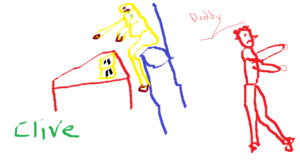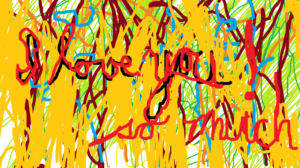“Bad Behavior” in Good Kids. How Come?
Why “Bad Behavior” From Kids Who Know
What Parents’ Expect?
The phrase, “bad behavior” worries me because behavior is complex and has meaning.
Children aren’t bad; they’re complicated.
So, if a child speaks or acts in a negative way, he or she is not a bad child, but a distressed child.
Finding Meaning in Your
Child’s “Bad” Behavior
The key to parenting is to find the meaning behind the behavior that’s gone amuck. When you know the meaning, you understand why the child took that action, and then it’s easy to figure out what to do about it.
A Story
A Six-Year-Old Identical Twin Hits His Brother
at School and at Home
The “Bad” Behavior: Hitting
Seemingly out of the blue, six-year-old Clive starts hitting his brother in school. The teacher is mystified. Clive is a sweet kid who follows the rules. The teacher is so surprised to see his sneaky taps and outright hits that she talks to him first, without a punishment. Clive’s brother’s a good kid, too, and takes Clive’s apologies readily. After about a week of this the teacher meets with the parents who confess the hitting has started at home, too. The teacher punishes Clive by taking away a privilege, his favorite activity, painting. Nothing changes.
The Brothers at Home
Both boys are fond of each other. Clive is generally keeps more to himself and hasn’t learned to read well yet. But he’s only in kindergarten. Why expect more? His brother, however, is more gregarious and reads well at this young age. The parents don’t tend to make overt comparisons though Mom spends more time with Clive and Dad with his brother. At this time, both Mom and the boys are stressed by Dad taking long necessary trips for his business. Mom works part-time while the boys are in school. She’s getting overwhelmed with no down time.
Finding Meaning Behind the Hitting
I’m going to shorten the story now and swiftly get to a discussion Clive and Dad have when Dad is home after one of his trips. Dad sees Clive at the computer using a paint program. “Clive! Could I take a little peek at your painting?” Clive quickly shut down the computer. “I don’t know. You might get mad at me,” answered Clive timidly. Dad was surprised. “Clive, I’m never mad at you. I can’t think of anything you could do to get me mad. A painting can’t make me mad. I promise.” Clive looked straight at his dad. He paused for quite a while as if what his dad said might not be true. He was still worried. But he knew it was true that dad never yelled at him, so he hesitantly opened the computer, and with a click his drawing popped up.
Dad’s Surprise
Dad was shocked when he looked to see his name on Clive’s picture. He didn’t know anything about children’s drawings, but clearly this was about him and Clive. “Clive, I see your name and my name. Yours is so big and green. Mine is small and red. What am I doing? Can you tell me?” Dad asked. “You are going away for a long time,” whispered Clive. “Okay,” said Dad worried. “Where am I going?” “I don’t know,” Clive replied, his brow wrinkled. “Well. If you don’t know, does anyone know?” Dad wondered out loud, trying to be as sensitive as he knew how. Something about the big daddy figure and the little printed name struck him as important. He’d have to think more about that later because although Clive had paused to consider dad’s question, he was answering it now.
Clive Speaks Up to Dad
“I think Mommy knows,” Clive answered slumping in his seat. “She knows why and she won’t tell me.” “Why won’t she tell you?” Dad asked quietly, totally confounded and even scared. Dad thought that his little son was shouldering something of momentous importance to him, and here they were alone, without his wife who would definitely be more understanding about all this.
Clive Thinks He’s Bad
“Because I’m BAD and she doesn’t want to hurt my feelings,” Clive replied. “She’s nice even when I’m bad. But my teacher isn’t anymore.” “Oh. What did your teacher do?” Dad felt this was going well but he didn’t know where it was leading. All he knew was that he felt incredibly sad for his little boy. He was only six and had such big, upsetting ideas. “She told me I couldn’t paint. I like to paint. I like to paint very much. Daddy, I want to paint in school.” Clive started to cry and climbed onto his daddy’s lap.
Dad and Clive Feel Close
Clive had never climbed into his lap before. This was a mommy thing. He sensed his son was beside himself with grief. He suddenly felt so close to Clive and even though he knew his son was so distressed, he knew something positive was happening between them. He looked back at the picture for more clues. He was very tempted to call his wife, but sensed he shouldn’t. This was between Clive and himself. He plunged in: “Clive, why did the teacher say you couldn’t paint?” “It’s because I’m BAD like I told you,” Clive paused and then blurted out, “I hit Ari. More than once, too. That is bad. REALLY BAD. And you went away. Far away.” “Clive, do you think I went away because you hit Ari?” Dad asked in fear.
The Meaning Unfolds
“No. You went away because I can’t read. You don’t like boys who can’t read. You like smart boys like Ari.” Dad found himself rocking Clive very slowly like a baby, having trouble following his son’s gloomy logic. What had he done to cause Clive to think he didn’t like him? It wasn’t what he had done. It was what he hadn’t done. He had never paid enough attention to Clive. When Clive had a problem reading, which wasn’t really a problem except in comparison to his brother, Clive imagined that Dad didn’t like him because of the reading and therefore went away. Gosh. It was an outlandish conclusion, but a child’s mind could create anything.
Another Part of the Puzzle
Then, before he could speak, Clive added another part of the puzzle: “Daddy, it’s okay. Don’t be upset. I don’t like me either, because I can’t read.” Dad was tearing up. His remarkably sensitive son, was consoling him! He had to speak now and be very clear. “Clive,” he said slowly. “I went away to make money for all of us. I NEVER go away because I don’t like you. I like you very much. I love you very much.” Clive stared at him and Dad continued, “Lots of kids don’t read when they are in kindergarten. You can take as long as you need to learn. It’s not a race to see who can read first.”
Why Punishments Don’t Work
“But the teacher said I couldn’t paint because I can’t read.” “Clive, she didn’t say that. She didn’t know why you were hitting and thought if you didn’t get to paint, you would stop hitting.” “What does painting have to do with hitting?” Clive asked befuddled. “I don’t hit when I paint. That’s impossible!” Dad couldn’t restrain himself. He laughed and Clive smiled, relieved his dad found something, anything, funny about all this. Clive’s body relaxed, and he looked at his father with a curious expression on his face. “Clive,” Dad asked. “Did you hit Ari because the teacher would call on him to read?” “My teacher was always my friend, but then she started calling on Ari a lot. More than me. I thought she liked him more because he could read so well. That made me mad, so I hit Ari.”
The Painting
“Gotcha,” Dad said pointing at the picture. “Clive, what are you doing here?” “Will you write the story if I tell it to you?” “Absolutely. Let’s do it,” “Go for it, pal.”
Clive’s Story
Clive began telling his story: “There was a boy falling off his chair because he couldn’t read the words in his notebook. His brother knew more words than he did. He felt like crying and did. Green tears.” Dad instantly saw the green tears in the picture coming from his son’s face that he had missed before. Clive continued: “He thought his father was mad at him and was leaving. He thought he was leaving because he was mad that his twin son didn’t know his words. But he thought wrong. His daddy was going to work. The end.” Dad smiled. Clive knew that he wasn’t mad and he was going to work. Terrific! Their talk had been understood by Clive.
Time to Relax When the Problem is Solved
Clive said. “I’m hungry. Can I finish my homework after we eat dinner?” Clive was ending their discussion. He found out what he needed to know. Relieved, he could attend to being hungry. “Sure,” Dad said grinning. “Would you like me to sit with you when you finish your notebook after dinner?” “Will you? OKAY.” Clive crowed. “And then I want to draw another picture, too. Can we write another story?” “You got it.” Clive gave his father a big hug. Actually, he had never gotten out of his lap.
The Moral of the Story
Clearly, Clive was not a bad kid. He was a great but confused kid. He wasn’t bad; he was distressed. Hitting had meaning and Dad got to the bottom of it. Their relationship grew. Finding meaning in your child’s behavior is what Parental Intelligence is all about. Oh, by the way. Clive made Dad one more painting.
 Note: This is a condensed version of a chapter, Jealousy in an Identical Twin: Six-Year-Old Clive, from an upcoming book:
Note: This is a condensed version of a chapter, Jealousy in an Identical Twin: Six-Year-Old Clive, from an upcoming book:



